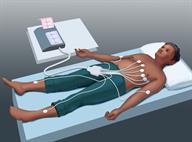ThisisPatientEngagementcontent
Electrocardiogram
Learn more about our Patient Engagement products now! Turn your patients into active participants in their healthcare by giving them easy access to the same evidence-based information you trust – but delivered in an easy-to-understand format.
An electrocardiogram is a test to check your heart rate and rhythm. It's often called an ECG or EKG. The test is simple and safe, and it doesn't hurt.
An ECG can help find out many things about the health of your heart. It may be done:There are no risks with this test.

The test may vary among providers and hospitals.
This information is not intended to replace advice given to you by your health care provider. Make sure you discuss any questions you have with your health care provider.
Cookies are used by this site. To decline or learn more, visit our cookie notice.
Copyright © 2025 Elsevier, its licensors, and contributors. All rights are reserved, including those for text and data mining, AI training, and similar technologies.